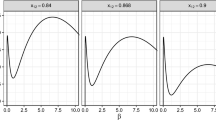Abstract
In this paper we consider the situation where we know the sum of n independent observations from the same probability distribution. We investigate how to empirically determine the marginal probability distributions of the different order statistics conditional upon knowing the sum. This research was motivated by explorations in process improvement where we know the total expected value or variance of a key measure of an n-step process and would like to estimate the proportion of the expected value or variance that is contributed by the most important step (i.e. the single step having the largest expected value or variance), the two most important steps, etc. Both graphical and tabular results are presented for exponential, gamma and normal distributions.
Similar content being viewed by others
References
Ahrens, J. H. and Dieter, U. (1974) Computer methods for sampling from gamma, beta, Poisson and binomial distributions. Computing, 12, 223–46.
Aitchison, J. (1986) The Statistical Analysis of Compositional Data. Chapman and Hall, New York.
Cheng, R. C. H. (1977) The generation of gamma variables with non-integral shape parameter. Applied Statistics, 26, 71–75.
Cheng, R. C. H. (1985) Generation of multivariate normal samples with given sample mean and covariance matrix. Journal of Statistical Computation and Simulation, 21, 39–49.
David, H. A. (1981) Order Statistics. Wiley, New York.
Devroye, L. (1986) Non-Uniform Random Variate Generation. Springer-Verlag, New York.
Evans, M., Hastings, N. and Peacock, B. (1993) Statistical Distributions, 2nd edn. Wiley, New York.
Gradshteyn, I. S. and Ryzhik, I. M. (1965) Table of Integrals, Series and Products. Academic Press, New York.
Huang, J. S. (1989) Moment problem of order statistics: a review. International Statistical Review, 57(1), 59–66.
Jönsson, H. and Silver, E. A. (1987) Modification of demand distributions on the basis of aggregate information. IIE Transactions, 19, 379–384.
Law, A. M. and Kelton, W. D. (1991) Simulation Modeling and Analysis, 2nd edn. McGraw-Hill, New York.
Miller, D. R. (1986) Exponential order statistic models of software reliability growth. IEE Transactions on Software Engineering, SE-12, 12–24.
Patel, J. K. and Read, C. B. (1982) Handbook of the Normal Distribution. Statistics: Textbooks and Monographs 40, Dekker, New York.
Pullin, D. I. (1979) Generation of normal variates with given sample mean and variance. Journal of Statistical Computation and Simulation, 9, 303–309.
Pyke, R. (1965) Spacings. Journal of the Royal Statistical Society, Series B, 7, 395–445.
Ross, S. M. (1990) A Course in Simulation. Macmillan, New York.
Wilks, S. S. (1962) Mathematical Statistics. Wiley, New York.
Author information
Authors and Affiliations
Rights and permissions
About this article
Cite this article
Silver, E.A., Costa, D. & Zangwill, W. Order statistics of independent identically distributed variables when the sum is known. Statistics and Computing 8, 253–265 (1998). https://doi.org/10.1023/A:1008961428961
Issue Date:
DOI: https://doi.org/10.1023/A:1008961428961




